人教版英语八年级下册Unit 9~10期末复习课件
文档属性
| 名称 | 人教版英语八年级下册Unit 9~10期末复习课件 |  | |
| 格式 | pptx | ||
| 文件大小 | 12.6MB | ||
| 资源类型 | 试卷 | ||
| 版本资源 | 人教新目标(Go for it)版 | ||
| 科目 | 英语 | ||
| 更新时间 | 2025-06-15 11:43:40 | ||
图片预览

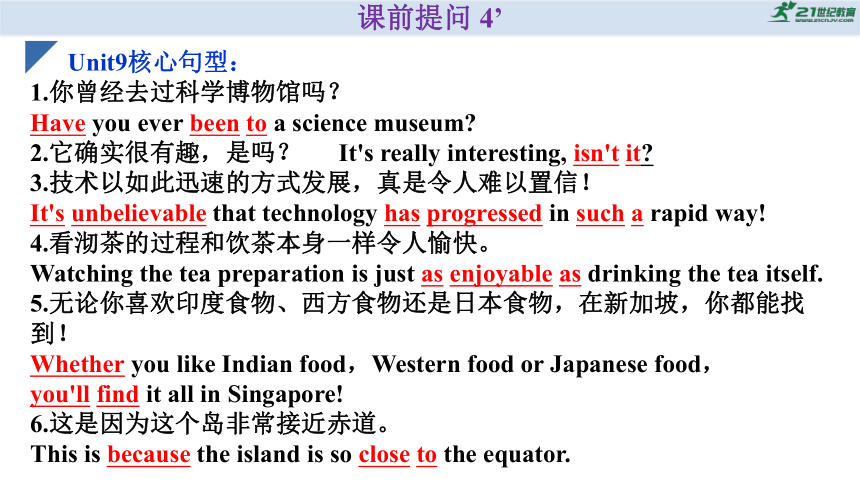
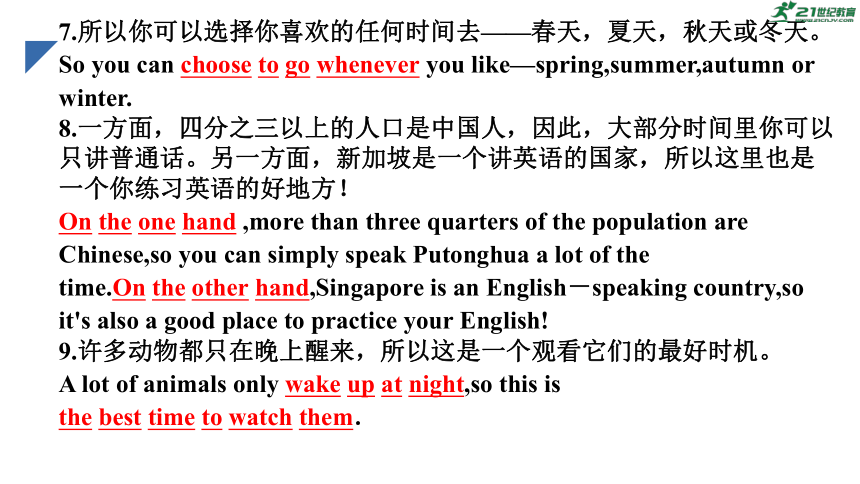
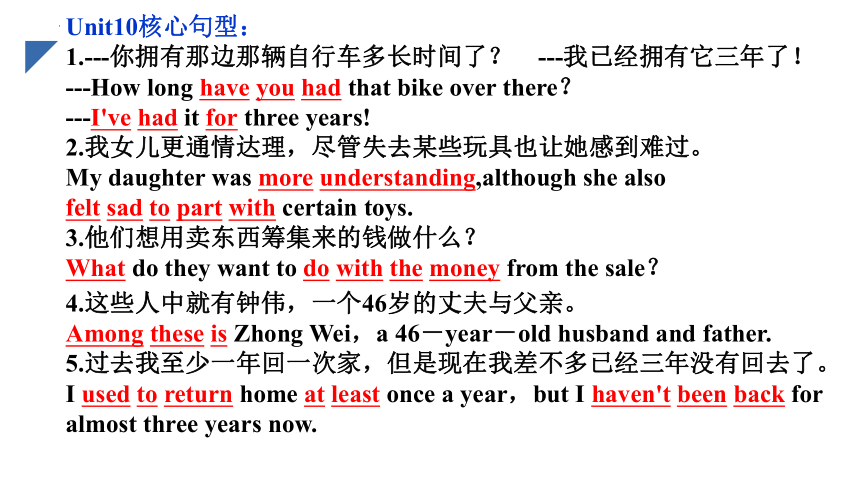
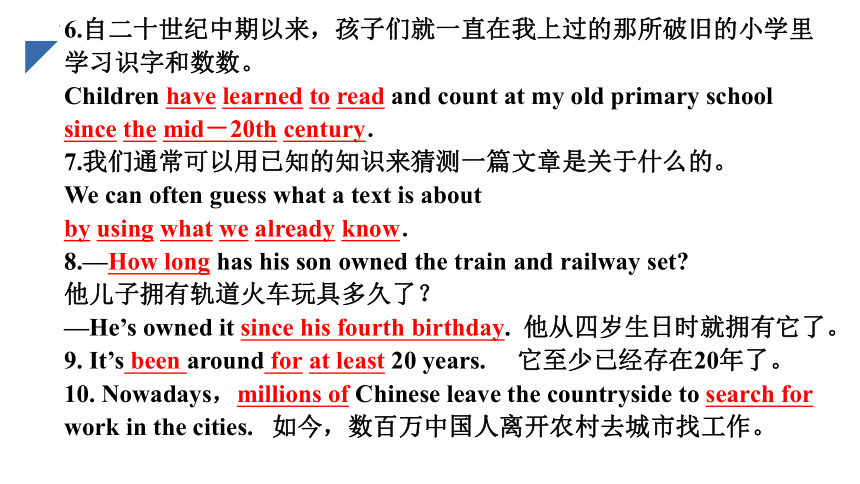
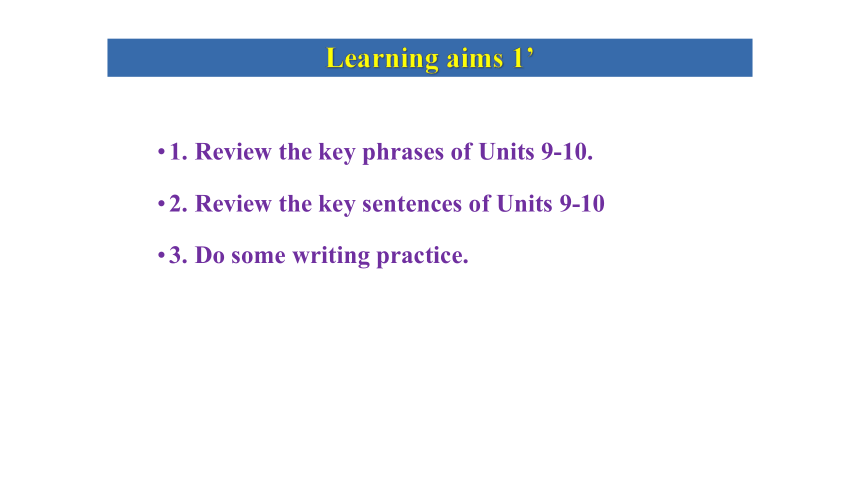
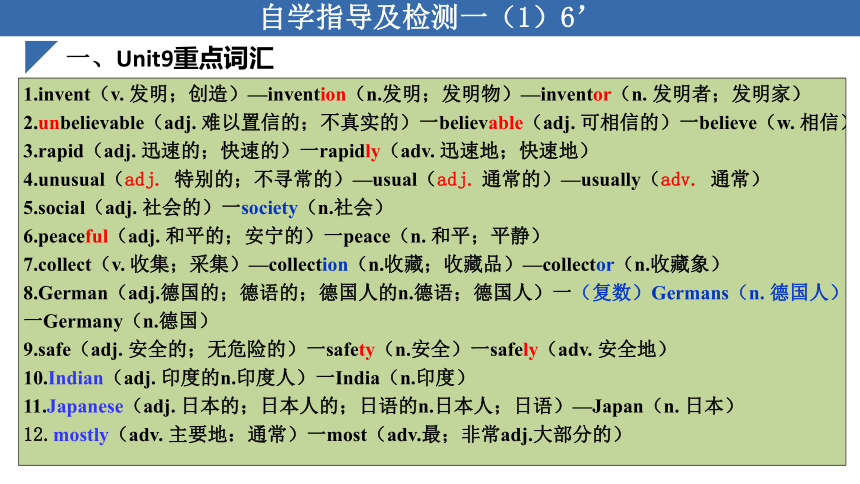
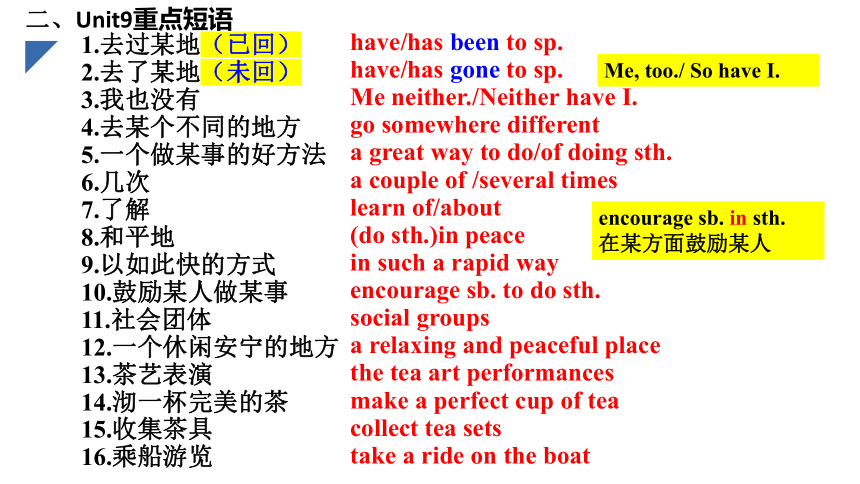
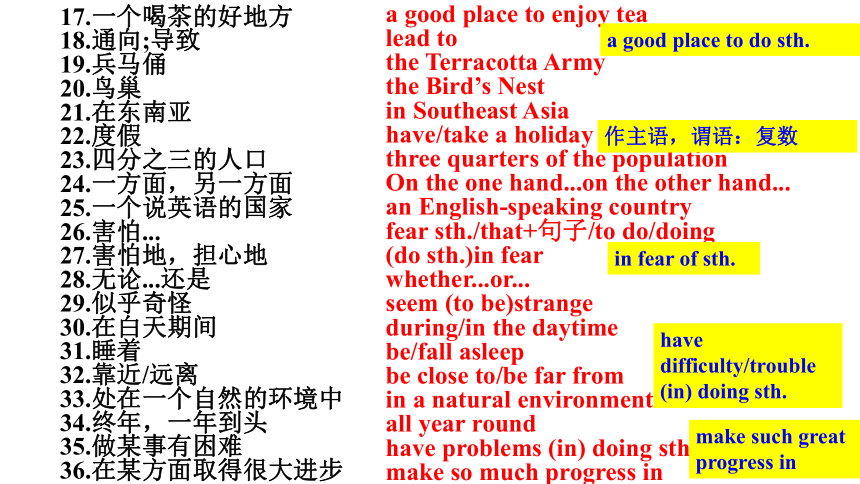

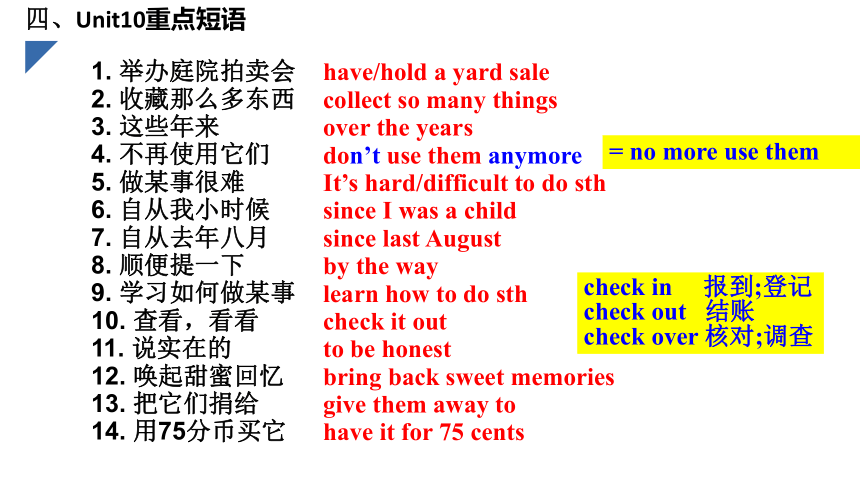
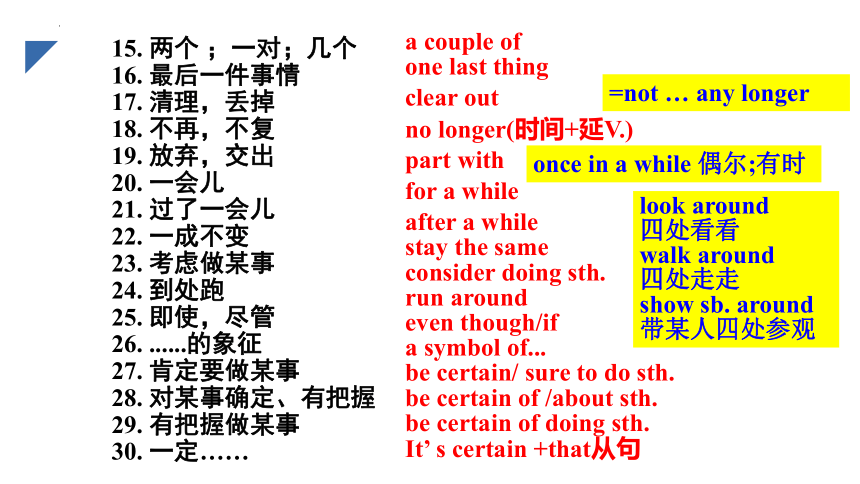
文档简介
(共54张PPT)
Review of U9-10
八年级英语下册
期末复习
课前提问 4’
Unit9核心句型:
1.你曾经去过科学博物馆吗?
Have you ever been to a science museum
2.它确实很有趣,是吗? It's really interesting, isn't it
3.技术以如此迅速的方式发展,真是令人难以置信!
It's unbelievable that technology has progressed in such a rapid way!
4.看沏茶的过程和饮茶本身一样令人愉快。
Watching the tea preparation is just as enjoyable as drinking the tea itself.
5.无论你喜欢印度食物、西方食物还是日本食物,在新加坡,你都能找到!
Whether you like Indian food,Western food or Japanese food,you'll find it all in Singapore!
6.这是因为这个岛非常接近赤道。
This is because the island is so close to the equator.
7.所以你可以选择你喜欢的任何时间去——春天,夏天,秋天或冬天。
So you can choose to go whenever you like—spring,summer,autumn or winter.
8.一方面,四分之三以上的人口是中国人,因此,大部分时间里你可以只讲普通话。另一方面,新加坡是一个讲英语的国家,所以这里也是一个你练习英语的好地方!
On the one hand ,more than three quarters of the population are Chinese,so you can simply speak Putonghua a lot of the time.On the other hand,Singapore is an English-speaking country,so it's also a good place to practice your English!
9.许多动物都只在晚上醒来,所以这是一个观看它们的最好时机。
A lot of animals only wake up at night,so this is the best time to watch them.
Unit10核心句型:
1.---你拥有那边那辆自行车多长时间了? ---我已经拥有它三年了!
---How long have you had that bike over there?
---I've had it for three years!
2.我女儿更通情达理,尽管失去某些玩具也让她感到难过。
My daughter was more understanding,although she also felt sad to part with certain toys.
3.他们想用卖东西筹集来的钱做什么?
What do they want to do with the money from the sale?
4.这些人中就有钟伟,一个46岁的丈夫与父亲。
Among these is Zhong Wei,a 46-year-old husband and father.
5.过去我至少一年回一次家,但是现在我差不多已经三年没有回去了。
I used to return home at least once a year,but I haven't been back for almost three years now.
6.自二十世纪中期以来,孩子们就一直在我上过的那所破旧的小学里学习识字和数数。
Children have learned to read and count at my old primary school since the mid-20th century.
7.我们通常可以用已知的知识来猜测一篇文章是关于什么的。
We can often guess what a text is about by using what we already know.
8.—How long has his son owned the train and railway set
他儿子拥有轨道火车玩具多久了?
—He’s owned it since his fourth birthday. 他从四岁生日时就拥有它了。
9. It’s been around for at least 20 years. 它至少已经存在20年了。
10. Nowadays,millions of Chinese leave the countryside to search for work in the cities. 如今,数百万中国人离开农村去城市找工作。
1. Review the key phrases of Units 9-10.
2. Review the key sentences of Units 9-10
3. Do some writing practice.
Learning aims 1’
自学指导及检测一(1)6’
安全n. safety
安全地adv. safely
1.invent(v. 发明;创造)—invention(n.发明;发明物)—inventor(n. 发明者;发明家)
2.unbelievable(adj. 难以置信的;不真实的)一believable(adj. 可相信的)一believe(w. 相信)
3.rapid(adj. 迅速的;快速的)一rapidly(adv. 迅速地;快速地)
4.unusual(adj. 特别的;不寻常的)—usual(adj. 通常的)—usually(adv. 通常)
5.social(adj. 社会的)一society(n.社会)
6.peaceful(adj. 和平的;安宁的)一peace(n. 和平;平静)
7.collect(v. 收集;采集)—collection(n.收藏;收藏品)—collector(n.收藏象)
8.German(adj.德国的;德语的;德国人的n.德语;德国人)一(复数)Germans(n. 德国人)一Germany(n.德国)
9.safe(adj. 安全的;无危险的)一safety(n.安全)一safely(adv. 安全地)
10.Indian(adj. 印度的n.印度人)一India(n.印度)
11.Japanese(adj. 日本的;日本人的;日语的n.日本人;日语)—Japan(n. 日本)
12.mostly(adv. 主要地:通常)一most(adv.最;非常adj.大部分的)
一、Unit9重点词汇
二、Unit9重点短语
1.去过某地(已回)
2.去了某地(未回)
3.我也没有
4.去某个不同的地方
5.一个做某事的好方法
6.几次
7.了解
8.和平地
9.以如此快的方式
10.鼓励某人做某事
11.社会团体
12.一个休闲安宁的地方
13.茶艺表演
14.沏一杯完美的茶
15.收集茶具
16.乘船游览
have/has been to sp.
have/has gone to sp.
Me neither./Neither have I.
go somewhere different
a great way to do/of doing sth.
a couple of /several times
learn of/about
(do sth.)in peace
in such a rapid way
encourage sb. to do sth.
social groups
a relaxing and peaceful place
the tea art performances
make a perfect cup of tea
collect tea sets
take a ride on the boat
Me, too./ So have I.
encourage sb. in sth.
在某方面鼓励某人
17.一个喝茶的好地方
18.通向;导致
19.兵马俑
20.鸟巢
21.在东南亚
22.度假
23.四分之三的人口
24.一方面,另一方面
25.一个说英语的国家
26.害怕...
27.害怕地,担心地
28.无论...还是
29.似乎奇怪
30.在白天期间
31.睡着
32.靠近/远离
33.处在一个自然的环境中
34.终年,一年到头
35.做某事有困难
36.在某方面取得很大进步
a good place to enjoy tea
lead to
the Terracotta Army
the Bird’s Nest
in Southeast Asia
have/take a holiday
three quarters of the population
On the one hand...on the other hand...
an English-speaking country
fear sth./that+句子/to do/doing
(do sth.)in fear
whether...or...
seem (to be)strange
during/in the daytime
be/fall asleep
be close to/be far from
in a natural environment
all year round
have problems (in) doing sth.
make so much progress in
have difficulty/trouble (in) doing sth.
a good place to do sth.
作主语,谓语:复数
in fear of sth.
make such great progress in
自学指导及检测一(2) 5’
安全n. safety
安全地adv. safely
三、Unit10重点词汇
1.memory(n.记忆;回忆)一memorize(v.记忆,记住)
2.make(V.制造)一maker(n.生产者;制订者)
3.own(v.拥有;有)一owner(n.物主;主人)
4.honestly(ad. 诚实地,正直地)一honesty(n.诚实)
5.True (adj.确实的;真正的)—truth(n.事实)一truthful(adj. 诚实的;真实的)—truthfully(adv.诚实地)
6.honest(adj.诚实的;老实的)—反义词:dishonest(adj.不诚实的)——honestly(adv.诚实地;真实地)——honesty(n. 诚实)
四、Unit10重点短语
1. 举办庭院拍卖会
2. 收藏那么多东西
3. 这些年来
4. 不再使用它们
5. 做某事很难
6. 自从我小时候
7. 自从去年八月
8. 顺便提一下
9. 学习如何做某事
10. 查看,看看
11. 说实在的
12. 唤起甜蜜回忆
13. 把它们捐给
14. 用75分币买它
have/hold a yard sale
collect so many things
over the years
don’t use them anymore
It’s hard/difficult to do sth
since I was a child
since last August
by the way
learn how to do sth
check it out
to be honest
bring back sweet memories
give them away to
have it for 75 cents
= no more use them
check in 报到;登记
check out 结账
check over 核对;调查
15. 两个 ;一对;几个
16. 最后一件事情
17. 清理,丢掉
18. 不再,不复
19. 放弃,交出
20. 一会儿
21. 过了一会儿
22. 一成不变
23. 考虑做某事
24. 到处跑
25. 即使,尽管
26. ......的象征
27. 肯定要做某事
28. 对某事确定、有把握
29. 有把握做某事
30. 一定……
a couple of
one last thing
clear out
no longer(时间+延V.)
part with
for a while
after a while
stay the same
consider doing sth.
run around
even though/if
a symbol of...
be certain/ sure to do sth.
be certain of /about sth.
be certain of doing sth.
It’ s certain +that从句
=not … any longer
once in a while 偶尔;有时
look around
四处看看
walk around
四处走走
show sb. around
带某人四处参观
31.选择(不)去做某事
32.寻找工作
33.在蜡笔厂
34.返回某地
35.在最近的一次回访
36.很遗憾......
37.搬回到...
38.变得更好
39.开网店
40.在上世纪中期
41.把.....当作......
42.根据
43.在学校对面
44.如此一个快乐的童年
choose (not) to do sth.
look/search for work
in a crayon factory
go back/return to sp.
on a recent visit
It’s a shame that...
move back to...
change for the better
open an online shop
in the middle of the last century
regard/consider...as...
according to
opposite the school
such a happy childhood
choose-chose-chosen
be regarded/considered as ...
41:......被当作.....
45. 在第21世纪
46. 在21世纪早期
47. 在21世纪中期
48. 在21世纪晚期
49. 在19 世纪 40 年代
in the 21st century
in the early 21st century
in the mid-21st century
=in the middle of the 21st century
in the late 21st century
in the 1840s/1840’s
century 相关短语:
two centuries = two hundred years
50)两个世纪
注意区分:在2025年 : in 2025 (in + 年份)
自学指导与检测二(1) 5’ 【难点/考点】
【考点1:Me neither与Me,too】
( )1.—It was the Dragon Boat Festival last Sunday. I drove to the Lianhua Lake to watch the boat races. How exciting!
—______,but I didn't see you there.
A.So I did B.So did I C.So do I D.Neither did I
( )2.—I have never been to Hawaii. What about Mike —______.
A.So has he B. Neither he has C.Neither has he D. So he has
3.—I like the number “9” best,because I think it stands for “long lasting”.
—________,______.So I choose the ninth floor to live on.
4.—I don't really like big cities.
—___ _______.I feel much freer in the countryside.
B
C
Me too
Me neither
=Neither do I
归纳:
我也没做过...
我也是
的确如此
Me neither=Neither +助动词/情态V/be+ I
Me too = So+ 助动词/情态V/be+I
So +主语+助动词/情态V/be
补全句子:(1). 长城是世界七大奇迹之一。
The Great Wall is one of the seven________in the world. (2).难怪你会累,你已经走了几个小时了。
___ ______ you 're tired, you've been walking for hours.
(3).我想知道明天是否会下雨。
I wonder ____________________________.
(4).我想知道他为什么上学总迟到。
I wonder __________________________.
wonders
No wonder
whether it will rain tomorrow
why he is always late for school
【考点2: wonder】
总结:
wonder 动词________,后面常接由__________________
等疑问词引导的宾语从句,且从句的语序为_________
wonder 后不加that引导的从句。作名词,意为______。
想知道
陈述句语序
奇观
what/when/if/whether
no wonder (that)+从句 “难怪”
【考点3:分数表达法】
( )1.—What do you think of the environment here
—Wonderful!____ of the land ____ covered with trees and grass.
A.Two fifths;is B.Two fifth;is
C.Two fifths;are D.Two fifth;are
( )2.Nowadays,a number of people like Huawei phones better,and about ____ of them ____ adults.
A.three fourth; is B.three fourths;are
C.three fourths;is D.third fourth;are
( )3.Among all these books, ______ of them are for children to read.
A.three fifth B.three fifths
C.threes fifth D.third fifth
A
B
B
三分之二 四分之一 四分之三
two thirds
one quarter
three quarters
= three fourths
分数的表达:分子用__________,分母用__________,
当分子大于1时,分母要_____。
拓展: 分数+of+n.作主语时,谓语动词的单复数要与后面的_____的数保持一致。
基数词
序数词
加s
名词
口诀:分子为基,分母为序;
分子大于一,分母加s.
Everything in the meeting is all right, _________ it
There are some pens on the desk, aren’t________
He could hardly finish his homework, _________he
You don’t have to go to school on Sundays,_____ you
总结:
反意疑问句,有两种结构:
(1)______陈述句+_______简短问句,即________;
(2)______陈述句+_______简短问句,即________;
(3)当陈述部分含有nothing,never,no,hardly,little,few等时,后面问句用______形式。
(4)反意疑问句的答语根据事实情况回答。
在前否后肯中,“Yes”译为“______”,“No”译为“_____”。
肯定的
否定的
前肯后否
否定的
肯定的
前否后肯
肯定
【1.难点】
isn’t
there
could
do
学生讨论,教师点拨一 4’【unit9】
不是
是
即时演练:
( )1. David never fights with his classmates,____
A. does he B. doesn’t he C. isn’t he D.is he
( )2. Everything seems all right, _____
A. does it B. don’t they C. won’t it D. doesn’t it
( )3. He is unhappy, _____
A. is he B. isn’t he C. doesn’t he D. does he
( )4. They have no time to visit the museum,_____
A.do they B.haven't they
C.don't they D.have they
( )5. There is a cup on the table,_____
A.is it B. isn’t it C. is there D. isn’t there
( )6. You have been to Beijing,_____ you
A.have B. be C.been D.haven’t
A
D
B
A
D
D
Everything depends on ________ we have enough time.
【2.易混点:whether与if】
1.The students studying abroad had to decide ________ to return or not.
2.We will cause less pollution ________ we can find ways to reuse or recycle more rubbish.
3.I have some tickets for the football match.I called my friends to see _____________ they'd like to go.
4.He looks worried.I wonder ___________ he has already known about the result.
5.
6. _______ it is in summer or in winter, Haikou is a nice place to go.
whether/if
whether
whether/if
whether/if
whether
Whether
宾语从句只能用whether的情况:
(1)从句后面有“or not”。 (2)后跟动词不定式。
(3)从句作介词的宾语。 (4) 从句位于句首的时候。
_____________________________________________
no longer “不再;不复” =not... any longer
no more “不再;不复” =not... anymore
翻译:他不再是一个小孩子。
He is no longer a kid./He is not a kid any longer.
考点4:
感悟例句,归纳用法:
Eg.Her father died, and after that she no longer went to school.
她的父亲去世了,那之后她就不再上学了。
= she didn’t go to school any longer.
There is no more bread. 没有面包了。
自学指导与检测二(2) 5’ 【难点/考点】
归纳:no longer 与 no more 的区别
no longer = not … any longer (句末) 表示时间上不再延续,常与延续性动词连用 He no longer works in the factory.
他不在这家工厂工作了。
no more = not… anymore 表示次数或程度上不再增加,常与非延续性/短暂性动词连用 You can drink no more. 你不能再喝了。
【即时演练】
1.—Li Hong feels sad ________ her family will move to another city.
—You mean they can’t live here ________ .
A.because; no longer B.for; no longer C.because; any longer
2.I don’t want to stay up late_________.
A.any longer B.no longer C.not any longer D.not no longer
3.They were good friends before, but they ________ like each other ________ after that thing.
A.not; any more B.don’t; no more C.don’t; any more
C
A
C
search ① vi.“搜索;搜查”
search for (sth. / sb.) = look for
② vt. 搜索,搜查,搜身
search sb. 对某人搜身
search sp. 对某地进行搜查
search + 地点+ for sth. 在某地搜寻某物
③ n. 寻找,搜索 :in search of 寻找
Mike has gone to the park in search of his dog.
Nowadays, millions of Chinese leave the countryside to search for work in the cities.
如今,数百万中国人离开农村去城市找工作。
search作动词,意为“搜索;搜查”,其后可直接跟宾语。
常用短语:search for“搜寻;寻找”,=look for,后面的宾语是寻找的目标。
Eg.They searched the forest. 他们搜查了森林。
You can search for jobs online. 你可以在网上找工作。
【考点5】
用search/search for适当形式填空:
1. He is ______________his sunglasses.
2. They are ___________ the room.
3. 他们在森林里寻找那个走失的小孩。
They ___________the forest _____the lost child.
searching for
searching
searched
for
[即时演练]
1.—Jim, could you help me send a book to Mr. Smith
—Sorry, not right now. I _________ for the information for my paper.
A.searched B.have searched C.am searching D.will search
2.We ________ everywhere in the house but we still can’t find the cat.
A.will search B.are searching C.have searched D.were searching
3.— How can we finish the project in such a short time
—Don’t worry! I _______ for some information and we can use it for the project now.
A.search B.have searched C.was searching D.will search
C
C
B
1.There are trees on ______ side of the road.
A. each B. each of C. every D. every of
2. Each of them _______ a foreign language.
A. speak B. speaks C. spoke D. spoken
A
B
【6.易错点:each/every】
each “各自;每个”
指两个或两个以上中的每一个
every “每个”
指三个或三个以上中的每一个
1. My sister and I each have an English-Chinese dictionary.
2. I go to school by bus every day.
each of + 复数n./ pron. 做主语, 谓语动词用单数。
即时演练:( )________ of them ______ a dictionary.
A. Each, have B. Every, has
C. Either, have D. Each, has
D
用since 和for填空。
(1) ________ two years (2) _______ two years ago
(3) ________ last month (4) _______ 1999
(5) ________ yesterday (6) _______ 4 o’clock
(7) ________ 4 hours (8) _______ an hour ago
(9) ________ we were children (10) _____ one minute
(11)He has lived in Nanjing _______ the year before last.
(12) I’ve known him ________ we were children.
(13) Our teacher has studied Japanese _______ three years.
(14) She has been away from the city _____ about ten years.
(15)It’s about ten years _______ she left the city.
易错易混点【for 和 since 在现在完成时中的应用】
for
since
since
since
since
since
for
since
since
for
since
since
for
for
since
学生讨论,教师点拨二 4’【unit10】
总结:(1)for 后接“____________”
(2)since “自……以来”,后接“____________”
____________
____________
____________
过去时间点
时间段
时间点+ago
last+时间点
过去式时间状语从句
(3) It’s+时间段+since… 自…以来已经…(多久)了
1.become — be 2.buy — have
3.put on — wear 4.borrow — keep
5.catch a cold — have a cold 6. get to know— know
7.begin/start— be on 8. finish— be over
9.die— be dead 10.leave— be away
11.open — be open 12.close—be closed
13.marry/get married —— be married
14.go out— be out 15. fall ill— be ill
16.get up— be up 17.fall asleep — be asleep
18.join— be in /be a member of+组织
e/go— be+ 相应的介词短语
20.get to/arrive in/reach— be in
短暂性动词与延续性动词的转换
考点
1.become — be 2.buy — have
3.put on — wear 4.borrow — keep
5.catch a cold — have a cold 6. get to know— know
7.begin/start— be on 8. finish— be over
9.die— be dead 10.leave— be away
11.open — be open 12.close—be closed
13.marry/get married —— be married
14.go out— be out 15. fall ill— be ill
16.get up— be up 17.fall asleep — be asleep
18.join— be in /be a member of+组织
e/go— be+ 相应的介词短语
20.get to/arrive in/reach— be in
即时演练:句型转换。
(1) He got to Beijing five minutes ago.
He ___________________ Beijing for _______________.
(2) I became a teacher in 2000.
I _____________ a teacher since ______________.
(3) The shop closed two hours ago.
The shop ______________________ for ____________.
(4) He left Puning five minutes ago.
He _______________________Puning for five minutes.
(5) My grandpa died in 2005.
My grandpa ___________________for ____________ .
(6) The meeting finished at six.
The meeting __________________ since ___________.
注意:短暂性动词arrive, buy, come, die, go, join, leave, lose, marry, receive在肯定句中,不与时间段连用。
has been in
five minutes
have been
2000
has been closed
two hours
has been away from
has been dead
20 years
has been over
6 o’clock
1.谈论曾去过的地方, 描述旅游景点, 介绍所见所闻等
2.描述物品承载的记忆、讲述周围事物的变化以及对未来的展望等
自学指导三3’
话题写作
U9:介绍南澳岛
U10:介绍家乡-汕头
Unit9话题是“有趣的地方”,该话题主要涉及人们曾经游览过的旅游胜地、城市或国家等。写作时多从它们的地理位置、人口、气候、景观和美食等方面入手。写作时,可以用have ever been to…描述某人曾经去过的地方,可以用have ever done sth.描述曾经经历过某事,可以用一般将来时表达对将来的期望。
写作指导
1. 描写某地的景色或景观时,一般要遵循的原则是:从总体到局部,从外到内。
2. 这类文章一般包括三段:开头是总体介绍,引出主题;中间是正文,具体介绍此地的特色,如著名的建筑、风景名胜等;第三部分是结尾。
3. 描写某地的短文属于说明文体,要弄清时间的立足点是"过去"、"现在",还是"将来"。
4. 表达方式要有所变化,景物描写用词容易重复、单调,因此写作时应选用不同的句式和表达方式来描述事物,使表达方式多样化。
教师点拨三 4’
二、常用句型1)开头句
1. I’ve been to an amusement park in London.
2. The best place I have ever been to is Sanya.
2)中间句
1. I visited the places of interest in Beijing and learned about the traditional culture.
2. The scenery was so interesting that I lost myself in it.
3)结尾句1. If you go there, I’m sure you will have a wonderful time.
2. What an exciting trip we had!
4)句子升格1. Xi’an has convenient transport.(升格为复合句)
→ One great thing about Xi’an is that it has convenient transport.
2. Please visit it. I am sure you can have a wonderful time. (升格为复合句)
→ If you visit it, I’m sure you can have a wonderful time.
◆谚语积累
All roads lead to Rome.条条大路通罗马。/殊途同归。
Reading ten thousand books is like traveling ten thousand miles.读万卷书,行万里路。
Unit10的写作项目是“个人物品或周围环境”, 属于“人与社会”主题范畴, 涉及子主题 “家乡和社会的变迁; 和谐家庭或社区生活”等。常见的写作任务是描述物品承载的记忆、讲述周围事物的变化以及对未来的展望等。
本单元谈论“个人物品和周围的东西”。
常用句型“I have had ...for/ since ..”来谈论你拥有某物多长时间了,以及它对你的影响。
写作步骤:
第一步:仔细审题:确认时态、人称、体裁
第二步:引出话题
第三步:介绍物品/家乡
第四步:表达自己的看法
二、常用句型1)开头句
1. My favorite thing from childhood is a toy bear.
2. Please allow me to introduce my beautiful hometown to you.
3. I have a lot of toys and I like the toy rabbit best of all.
2)中间句1. The toy bear has left me so many sweet memories.
2. It’s special to me because I used to play with it almost every day.
3)结尾句1. We could not only make full use of old things, but also make some money in this way.
2. I believe you will fall in love with my city and have a wonderful time.
4)句子升格
1. I don’t want to part with these toys. I’m getting older. (升格为含though 引导的让步状语从句的句子)
→I don’t want to part with these toys though I’m getting older.
2. I’ll keep it forever. It can remind me of my grandma. (升格为动词不定式表目的的句子)
→ I’ll keep it forever to remind me of my grandma.
自学检测三 6’
一、家乡是每个人心底的根,是每个人心中最特别的地方。你的家乡正在开展主题为“My Hometown, My Love”的演讲活动,请用英文写一篇演讲稿。
内容包括:
1.介绍我的家乡,如:美景、美食、风俗、人文、家乡的变化等;
2.欢迎游览我的家乡及游览注意事项,如:最佳游览时间、交通方式等。
注意:1.词数:100 左右; 2.可进行适当发挥; 3.不得出现真实的人名、校名等相关信息。
【详解】[总体分析]
①体裁:本文是一篇应用文,是一篇演讲稿;
②时态:本文时态为一般现在时;
③提示:写作要点已给出,应注意不要遗漏题干给出的要点,适当增加细节,灵活运用恰当的句型,使行文流畅自然。
[写作步骤]
第一步,总体介绍家乡是什么地方;
第二步,详细介绍家乡是个什么样的地方,如景点、美食、风俗、气候和发展情况等,
第三步,总结并表达对家乡的热爱,欢迎读者光临。
【答案】例文:
Dear everyone, would you please be kind enough to vote for my home town
My home town Jiangshan is in the west of Zhejiang Province. It is on the east of Jiangxi Province. It has a population of about 0.6 million. The people here are very friendly. The house we live in now is big and clean. Our living conditions have also been greatly improved. There are a lot of places of interest here, such as Jianglang Mountain and Shigu Canyon.(there be句型表示某地有某物;such as表示“例如”) Every year, lots of visitors come here in spring. They enjoy themselves a lot in my home town. Also, you can taste much delicious food, such as Zongzi and rice cake. May is the best time to visit my hometown. The weather is neither too hot nor too cold(不冷也不热). Our transportation here is very convenient. There are buses and taxis. You can’t litter when you come here. And if someone helps you, say thank you.
If you have a chance to visit my home town, I’m sure you’ll have a good time.。(if引导条件状语从句)
二、每个人都会有一个专属的童年,在这期间,你也许会有一些(个)格外珍惜的物品,它(们)会给你留下比较深刻的回忆。你孩童时代最喜欢并且保留的东西是什么呢 请你根据下面的问题提示写一篇英语短文,介绍一下吧。
1. What is your favourite thing from childhood which you still have
2. How long have you had it
3. How did you get it Did someone give it to you Who
4. Why do you like it so much Can you say something more about it
写作要求:
1. 紧扣主题,结合提示信息,适当发挥,语言表达准确、语义通顺连贯;
2. 书写工整,不少于80词。请考生将题目写在答题卡相应处;
3. 文中不得出现你的任何真实信息(校名,姓名,地名等)。
My favourite thing from childhood
My favorite thing from childhood is
____________________________________________________________________
【详解】[总体分析] ①题材:本文是一篇材料作文;
②时态:时态主要为一般过去时和一般现在时;
③提示:写作时注意围绕所给问题展开描述,可适当发挥。
[写作步骤]
第一步,介绍自己孩童时期最喜欢的物品是什么;
第二步,介绍自己拥有该物品多久了,具体描述如何得来的该物品;
第三步,介绍自己喜欢该物品的原因及感想。
【答案】例文
My favourite thing from childhood
My favorite thing from childhood is my teddy bear. I have had it since I was five years old. My grandmother gave it to me as the birthday gift on my birthday.
I like the teddy bear so much because it’s dressed in my favorite color(because引导的原因状语从句). It’s special to me because my grandmother made it for me. She was always kind to me. Her words and the lovely toy bear made me feel better.
The teddy bear has given me many good memories. I remember when I was young, I was afraid of the dark, so I held my teddy bear to feel safe (宾语从句及when引导的时间状语从句). Whenever I miss my grandmother, I will look at the toy bear, and it makes me feel happy and warm.
三、根据表格所给内容要点,以"The changes in my hometown"为题写一篇英语短文。要点如下:
过去 1.空气清新,环境很好;2.房屋又小又旧,人们走路或是骑车去上班;
3.是一个宁静的地方。
现在 1.住房宽敞明亮,很多人都有了自己的汽车;
2.这些变化给年轻人带来了现代化的生活,他们都感到很高兴;
3.树比以前少了,环境不如以前好了。
将来 请你展望家乡的未来(1—2句)。
要求:1.字迹工整,要点全面;2. 90 词左右。
The changes in my hometown
审题 体裁 说明文 话题 家乡的变化
时态 一般过去时,一般现在时,现在完成时 人称 以第三人称为主
段落 布局 the air was fresh, the environment was good, the houses were small and 描述家乡的过去 old, people went to work on foot or by bike, a quiet place the houses are big and bright, many 描述家乡 people have their own cars, bring 的现在 young people a modern life, fewer trees, the environment is not as good as before 展望家乡 → I hope my hometown will be... 的未来 参考词汇in the past 过去;go to work 去上班;on foot 步行;by bike 骑自行车;
feel happy 感到高兴not as good as 不如……好
参考句子1. My hometown has changed a lot in recent years.最近几年,我的家乡发生了很大变化。 2. It used to be a/an... place. 它过去是个……地方。
3. Now things have changed a lot. 现在事情发生了很大变化。
4. I hope my hometown... 我希望我的家乡……
4.高分例文
The changes in my hometown
My hometown has changed a lot in recent years.①In the past, the air here was very fresh and the environment was good. The houses were small and old.People went to work on foot or by bike. It used to be a very quiet place.
②Now things are quite different. The houses are big and bright. Many people have their own cars. The changes have brought young people a modern life. They all feel happy. ③But there are fewer trees, and the environment is not as good as before.
④I hope my hometown will be more and more beautiful so that we can live a happier life.
例文分析:文章开门见山,引出话题,接着分段描述家乡的今昔变化,并对未来进行了展望,思路清晰,条理分明,行文合理、紧凑。
①句使用短语 In the past,引出对家乡过去情况的描述;
②句总领第二段,引出对家乡现在情况的描述;
③句运用比较级和 not as... as 结构,将家乡的现在与过去进行了比较;
④句中I hope 后的宾语从句引出对家乡未来的展望。
Summary 1’
1. 复习Units 9-10 重点短语;
2. 复习Units 9-10 重点句子;
3. 复习单元重点语法;
4. 复习话题作文。
一、单项选择。5’
( )1. —I'm going to take this summer holiday in Taiwan.
—Oh, really Taiwan is ____ a beautiful island that _____ people in Guangdong go to visit it every year.
A. so; thousands B.so; thousands of
C. such; thousands D.such; thousands of
( )2.—I don't like rock music. —___.I think it's too noisy.
A.So do I B.So I do
C.Neither do I D.Neither I do
( )3. In our class, __ of the students are from the same city.
A.two fifth B.two fifths
C.second fifth D.second fifths
( )4. —I wonder when you ________ the new watch.
—Well, I ________ it for two weeks.
A.have bought; have had B. bought; have bought
C.bought; have had D. have bought; had
必做题
D
当堂训练 15’
C
B
C
( )1. chickens have been killed because of the
terrible bird flu(禽流感). A.Ten millions B.Ten millions of C.Ten million of D.Millions of
( )2.The police every corner of the country _____
the missing child.
A.looked; for B.searched; to
C.searched; for D.looked; to
( )3.It was storm that we were all wet.
A.so heavy B.such a heavy
C.so a heavy D.such heavy
( )4.Last year, three hundred English teachers took
part in the English Training.
A.two month B.two months
C.two months D.two month
( )5.—How long have you this car —For almost 10 years.
A.bought B.sold C.borrowed D.had
D
C
B
A
D
( )6.—How long have you been learning English
—Since I a student.
A.am B.was C.did D.do
( )7.—Have you finished your homework yet
—Yes.I it twenty minutes ago.
A.have finished B.finished
C.will finish D.had finished
8.Since I ________ helping as a volunteer in the school library last term, I _______ both reading books and helping others.
A.start; enjoyed B.have started; have enjoyed
C.have started; enjoyed D.started; have enjoyed
B
B
D
句意:自从我上学期开始在学校图书馆做志愿者以来,我既喜欢读书,也喜欢帮助别人。考查动词时态。第一空,根据“last term”可知,从句时态应用一般过去时,谓语动词应用过去式started;第二空,“I ... both reading books and helping others”是主句,根据 “since”引导从句的时态规则,主句要用现在完成时,其结构为have/has +过去分词;主语为“I”,助动词应用“have”,动词“enjoy”的过去分词是“enjoyed”。
1.—Sorry, Miss Tang, I am late. —It doesn’t matter. The class ________ for just several minutes. You don’t miss too much.
A.beganB.has begunC.has been onD.is beginning
2.—Mary, did you go ________ last summer vacation
—Yes. I went to Hangzhou.
A.wonderful anywhere B.anywhere wonderful
C.somewhere wonderful D.wonderful somewhere
3.Ted’s father is a famous ________. He ________ many modern tools so far.
A.invention; invents B.inventor; has invented
C.invention; invented D.inventor; invents
4.—Have you ever ________ Paris —Yes. I ________ there in July to see the opening ceremony of the 2024 Paris Olympics.
A.gone to; have gone B.been to; have gone C.been to; went D.gone to; went
5.Our government is building ____ cheap and modern buildings for the people.
A.two thousands B.thousand of C.thousands of D.two thousands of
6.As an exchange student, Alan ________ Shanghai for three years.
A.has been to B.has been in C.has gone to D.has been
C
B
B
C
C
C
二、用never, ever, already, yet, for, since填空
1. I have _____ seen him before, so I have no idea about him.
2. Jack has _________ finished his homework _____an hour ago.
3.Mr. Wang has taught in this school ______ ten years.
4. —“Have you ____ seen the film ”
—“No, I have ______ seen it.”
5. “Has the bus left ______ ” “Yes, it has _________ left.”
never
already
since
for
ever
never
yet
already
必做题
( )1. A. was worried about B.was ready for
C.was interested in D.was afraid of
( )2. A. bored B.sad C.hungry D.tired
( )3. A. find B.pick C.share D.cook
C
C
三、完形填空 5’ 必做题
There was a spider (蜘蛛)and a turtle living near a river.One day, Spider 1 his dinner. He was just about to eat when Turtle passed by his house. Turtle was really 2 and wanted to join him. However, Spider didn’t want to 3 his food with Turtle.
B
( )4. A. memory B.voice C.problem D.idea
( )5. A. arms B.feet C.eyes D.ears
( )6. A. sadly B.happily C.excitedly D.loudly
A
B
Suddenly, a good 4 came to him and he said, “In my house, you must wash hands before dinner.” Turtle walked to the river and washed his hands. As he walked back to the house, his hands got dirty. He tried again and again, but it was no use. How could he keep his hands clean when they were also his 5 ? At last, Turtle walked away 6 without any food.
D
( )7. A. agreed B.forgot C.decided D.refused
( )8. A. taking away B.pointing at C.putting up D.waiting for
( )9. A. thin B.heavy C.short D.tall
( )10. A. Luckily B.Suddenly C.Finally D.Probably
C
B
D
One day, Turtle saw Spider again and he 7 to give Spider a lesson. He invited Spider to his dinner. While Spider was 8 the food, Turtle was diving (下潜)down into the water to his home. When he came out, he said, “OK, Spider, come and get it. In my house, you must eat under water.” Spider tried several times to dive under the water, but he was not 9 enough to dive, so he could only float (漂浮). 10 , he had to go home hungry.
Several days later, both of them got tired of eating alone. They said together,“Why not meet for dinner in the woods?”
C
假如你是李华,你的外国笔友Tom 特别关注中国政府和人民在脱贫攻坚战中取得的胜利,请你以春节期间到乡下爷爷家过年的经历为例,给他写一封部件,内容包括∶
1. 与过去的贫困对比,介绍现在农村脱贫后的情况;
2. 简要说明脱贫成功的原因。
注意∶1,字数 100 左右;
2.可适当增加细节,以使行文连贯;
3.开头与结尾已给出,不计入字数。
Dear Tom,
I am highly grateful for your concern about my country's anti-poverty, which is considered a wonder.
________________________________________________
________________________________________________
I hope you can visit our country and feel the great changes.
四、写作。 3’
选做题
Dear Tom,
I am highly grateful for your concern about my country's anti-poverty, which is considered a wonder.
I happened to spend the Spring Festival living in my grandpa's home, which is surrounded by mountains. In the past, the people there were so poor that it was not easy to get enough food to feed themselves, let alone beautiful clothing and tall buildings. Some teens were forced to(被迫) leave school to go out working in cities.
Now with the help of the government and all the people from the rich areas, all of them have gotten out of absolute poverty(摆脱绝对贫困). Every family lives in new flats, even some of them owning cars. Children can enjoy free education and the old are provided with free health care.
I hope you can visit our country and feel the great changes.
板书设计
Unit9
1.a great way to do sth. 一个做某事的好方法
2.It's unbelievable that... 很难相信....
3.see sb. doing sth. 看见某人正在做某事
4.encourage sb. to do sth. 鼓励某人做某事
5.as...as... 和.....一样.....
6.this is the best time to do sth. 这是做某事的最佳时间
7.have problems (in)doing sth. 做某事有困难
8.It seems +adj. + to do sth. 做某事似乎是.....的。
9.choose to do sth. 选择做某事
Unit10
1.how long
2.bring back
3.not…anymore
4.as
5.no longer
6.at least
7.search for
8.46-year-old
9.according to
10.hold
11.in one’s opinion
①肯定的陈述句 + 否定的附加疑问句 →“前 肯 后 否 ”
You are from Guangdong, aren’t you
②否定的陈述句+肯定的附加疑问句→ “前 否 后 肯”
Tom doesn’t live inGuilin,does he
【注意】反意疑问句前后在人称和数方面要保持一致,be动词、助动词或情态动词也要保持一致。
Eg.She doesn’t like shopping, does she 她不喜欢购物,是吗?
He can’t speak French, can he 他不会说法语,对吗?
考点 3.反义疑问句
It’s really interesting, isn’t it 它真的很有趣,不是吗?
*反义疑问句:用来询问对方的看法或对某事没有把握需要对方证实
1.提问由两部分组成:“陈述句+简短的疑问句,两部分的人称及时态应保持一致。
② 肯定回答:Yes, 主语+肯定结构.
否定回答:No, 主语+否定结构.
③ 当陈述部分是否定句时,答语中的Yes译为“不”,No译为“是”.
Eg. --- You don’t like classical music, do you --- Yes, I do. / No, I don’t.
不,我喜欢。 / 是的,我不喜欢。
(2)陈述句部分含有nothing、never、hardly等表示否定意义的词时,附加疑问句用肯定形式。
Eg.You hardly understand me, do you 你几乎不理解我,是吗?
2. 反意疑问句的回答:① 答语都要与事实情况一致。
② 肯定回答:Yes, 主语+肯定结构.
否定回答:No, 主语+否定结构.
③ 当陈述部分是否定句时,答语中的Yes译为“不”,No译为“是”.
Eg. --- You don’t like classical music, do you --- Yes, I do. / No, I don’t.
不,我喜欢。 / 是的,我不喜欢。
(2)陈述句部分含有nothing、never、hardly等表示否定意义的词时,附加疑问句用肯定形式。
Eg.You hardly understand me, do you 你几乎不理解我,是吗?
Review of U9-10
八年级英语下册
期末复习
课前提问 4’
Unit9核心句型:
1.你曾经去过科学博物馆吗?
Have you ever been to a science museum
2.它确实很有趣,是吗? It's really interesting, isn't it
3.技术以如此迅速的方式发展,真是令人难以置信!
It's unbelievable that technology has progressed in such a rapid way!
4.看沏茶的过程和饮茶本身一样令人愉快。
Watching the tea preparation is just as enjoyable as drinking the tea itself.
5.无论你喜欢印度食物、西方食物还是日本食物,在新加坡,你都能找到!
Whether you like Indian food,Western food or Japanese food,you'll find it all in Singapore!
6.这是因为这个岛非常接近赤道。
This is because the island is so close to the equator.
7.所以你可以选择你喜欢的任何时间去——春天,夏天,秋天或冬天。
So you can choose to go whenever you like—spring,summer,autumn or winter.
8.一方面,四分之三以上的人口是中国人,因此,大部分时间里你可以只讲普通话。另一方面,新加坡是一个讲英语的国家,所以这里也是一个你练习英语的好地方!
On the one hand ,more than three quarters of the population are Chinese,so you can simply speak Putonghua a lot of the time.On the other hand,Singapore is an English-speaking country,so it's also a good place to practice your English!
9.许多动物都只在晚上醒来,所以这是一个观看它们的最好时机。
A lot of animals only wake up at night,so this is the best time to watch them.
Unit10核心句型:
1.---你拥有那边那辆自行车多长时间了? ---我已经拥有它三年了!
---How long have you had that bike over there?
---I've had it for three years!
2.我女儿更通情达理,尽管失去某些玩具也让她感到难过。
My daughter was more understanding,although she also felt sad to part with certain toys.
3.他们想用卖东西筹集来的钱做什么?
What do they want to do with the money from the sale?
4.这些人中就有钟伟,一个46岁的丈夫与父亲。
Among these is Zhong Wei,a 46-year-old husband and father.
5.过去我至少一年回一次家,但是现在我差不多已经三年没有回去了。
I used to return home at least once a year,but I haven't been back for almost three years now.
6.自二十世纪中期以来,孩子们就一直在我上过的那所破旧的小学里学习识字和数数。
Children have learned to read and count at my old primary school since the mid-20th century.
7.我们通常可以用已知的知识来猜测一篇文章是关于什么的。
We can often guess what a text is about by using what we already know.
8.—How long has his son owned the train and railway set
他儿子拥有轨道火车玩具多久了?
—He’s owned it since his fourth birthday. 他从四岁生日时就拥有它了。
9. It’s been around for at least 20 years. 它至少已经存在20年了。
10. Nowadays,millions of Chinese leave the countryside to search for work in the cities. 如今,数百万中国人离开农村去城市找工作。
1. Review the key phrases of Units 9-10.
2. Review the key sentences of Units 9-10
3. Do some writing practice.
Learning aims 1’
自学指导及检测一(1)6’
安全n. safety
安全地adv. safely
1.invent(v. 发明;创造)—invention(n.发明;发明物)—inventor(n. 发明者;发明家)
2.unbelievable(adj. 难以置信的;不真实的)一believable(adj. 可相信的)一believe(w. 相信)
3.rapid(adj. 迅速的;快速的)一rapidly(adv. 迅速地;快速地)
4.unusual(adj. 特别的;不寻常的)—usual(adj. 通常的)—usually(adv. 通常)
5.social(adj. 社会的)一society(n.社会)
6.peaceful(adj. 和平的;安宁的)一peace(n. 和平;平静)
7.collect(v. 收集;采集)—collection(n.收藏;收藏品)—collector(n.收藏象)
8.German(adj.德国的;德语的;德国人的n.德语;德国人)一(复数)Germans(n. 德国人)一Germany(n.德国)
9.safe(adj. 安全的;无危险的)一safety(n.安全)一safely(adv. 安全地)
10.Indian(adj. 印度的n.印度人)一India(n.印度)
11.Japanese(adj. 日本的;日本人的;日语的n.日本人;日语)—Japan(n. 日本)
12.mostly(adv. 主要地:通常)一most(adv.最;非常adj.大部分的)
一、Unit9重点词汇
二、Unit9重点短语
1.去过某地(已回)
2.去了某地(未回)
3.我也没有
4.去某个不同的地方
5.一个做某事的好方法
6.几次
7.了解
8.和平地
9.以如此快的方式
10.鼓励某人做某事
11.社会团体
12.一个休闲安宁的地方
13.茶艺表演
14.沏一杯完美的茶
15.收集茶具
16.乘船游览
have/has been to sp.
have/has gone to sp.
Me neither./Neither have I.
go somewhere different
a great way to do/of doing sth.
a couple of /several times
learn of/about
(do sth.)in peace
in such a rapid way
encourage sb. to do sth.
social groups
a relaxing and peaceful place
the tea art performances
make a perfect cup of tea
collect tea sets
take a ride on the boat
Me, too./ So have I.
encourage sb. in sth.
在某方面鼓励某人
17.一个喝茶的好地方
18.通向;导致
19.兵马俑
20.鸟巢
21.在东南亚
22.度假
23.四分之三的人口
24.一方面,另一方面
25.一个说英语的国家
26.害怕...
27.害怕地,担心地
28.无论...还是
29.似乎奇怪
30.在白天期间
31.睡着
32.靠近/远离
33.处在一个自然的环境中
34.终年,一年到头
35.做某事有困难
36.在某方面取得很大进步
a good place to enjoy tea
lead to
the Terracotta Army
the Bird’s Nest
in Southeast Asia
have/take a holiday
three quarters of the population
On the one hand...on the other hand...
an English-speaking country
fear sth./that+句子/to do/doing
(do sth.)in fear
whether...or...
seem (to be)strange
during/in the daytime
be/fall asleep
be close to/be far from
in a natural environment
all year round
have problems (in) doing sth.
make so much progress in
have difficulty/trouble (in) doing sth.
a good place to do sth.
作主语,谓语:复数
in fear of sth.
make such great progress in
自学指导及检测一(2) 5’
安全n. safety
安全地adv. safely
三、Unit10重点词汇
1.memory(n.记忆;回忆)一memorize(v.记忆,记住)
2.make(V.制造)一maker(n.生产者;制订者)
3.own(v.拥有;有)一owner(n.物主;主人)
4.honestly(ad. 诚实地,正直地)一honesty(n.诚实)
5.True (adj.确实的;真正的)—truth(n.事实)一truthful(adj. 诚实的;真实的)—truthfully(adv.诚实地)
6.honest(adj.诚实的;老实的)—反义词:dishonest(adj.不诚实的)——honestly(adv.诚实地;真实地)——honesty(n. 诚实)
四、Unit10重点短语
1. 举办庭院拍卖会
2. 收藏那么多东西
3. 这些年来
4. 不再使用它们
5. 做某事很难
6. 自从我小时候
7. 自从去年八月
8. 顺便提一下
9. 学习如何做某事
10. 查看,看看
11. 说实在的
12. 唤起甜蜜回忆
13. 把它们捐给
14. 用75分币买它
have/hold a yard sale
collect so many things
over the years
don’t use them anymore
It’s hard/difficult to do sth
since I was a child
since last August
by the way
learn how to do sth
check it out
to be honest
bring back sweet memories
give them away to
have it for 75 cents
= no more use them
check in 报到;登记
check out 结账
check over 核对;调查
15. 两个 ;一对;几个
16. 最后一件事情
17. 清理,丢掉
18. 不再,不复
19. 放弃,交出
20. 一会儿
21. 过了一会儿
22. 一成不变
23. 考虑做某事
24. 到处跑
25. 即使,尽管
26. ......的象征
27. 肯定要做某事
28. 对某事确定、有把握
29. 有把握做某事
30. 一定……
a couple of
one last thing
clear out
no longer(时间+延V.)
part with
for a while
after a while
stay the same
consider doing sth.
run around
even though/if
a symbol of...
be certain/ sure to do sth.
be certain of /about sth.
be certain of doing sth.
It’ s certain +that从句
=not … any longer
once in a while 偶尔;有时
look around
四处看看
walk around
四处走走
show sb. around
带某人四处参观
31.选择(不)去做某事
32.寻找工作
33.在蜡笔厂
34.返回某地
35.在最近的一次回访
36.很遗憾......
37.搬回到...
38.变得更好
39.开网店
40.在上世纪中期
41.把.....当作......
42.根据
43.在学校对面
44.如此一个快乐的童年
choose (not) to do sth.
look/search for work
in a crayon factory
go back/return to sp.
on a recent visit
It’s a shame that...
move back to...
change for the better
open an online shop
in the middle of the last century
regard/consider...as...
according to
opposite the school
such a happy childhood
choose-chose-chosen
be regarded/considered as ...
41:......被当作.....
45. 在第21世纪
46. 在21世纪早期
47. 在21世纪中期
48. 在21世纪晚期
49. 在19 世纪 40 年代
in the 21st century
in the early 21st century
in the mid-21st century
=in the middle of the 21st century
in the late 21st century
in the 1840s/1840’s
century 相关短语:
two centuries = two hundred years
50)两个世纪
注意区分:在2025年 : in 2025 (in + 年份)
自学指导与检测二(1) 5’ 【难点/考点】
【考点1:Me neither与Me,too】
( )1.—It was the Dragon Boat Festival last Sunday. I drove to the Lianhua Lake to watch the boat races. How exciting!
—______,but I didn't see you there.
A.So I did B.So did I C.So do I D.Neither did I
( )2.—I have never been to Hawaii. What about Mike —______.
A.So has he B. Neither he has C.Neither has he D. So he has
3.—I like the number “9” best,because I think it stands for “long lasting”.
—________,______.So I choose the ninth floor to live on.
4.—I don't really like big cities.
—___ _______.I feel much freer in the countryside.
B
C
Me too
Me neither
=Neither do I
归纳:
我也没做过...
我也是
的确如此
Me neither=Neither +助动词/情态V/be+ I
Me too = So+ 助动词/情态V/be+I
So +主语+助动词/情态V/be
补全句子:(1). 长城是世界七大奇迹之一。
The Great Wall is one of the seven________in the world. (2).难怪你会累,你已经走了几个小时了。
___ ______ you 're tired, you've been walking for hours.
(3).我想知道明天是否会下雨。
I wonder ____________________________.
(4).我想知道他为什么上学总迟到。
I wonder __________________________.
wonders
No wonder
whether it will rain tomorrow
why he is always late for school
【考点2: wonder】
总结:
wonder 动词________,后面常接由__________________
等疑问词引导的宾语从句,且从句的语序为_________
wonder 后不加that引导的从句。作名词,意为______。
想知道
陈述句语序
奇观
what/when/if/whether
no wonder (that)+从句 “难怪”
【考点3:分数表达法】
( )1.—What do you think of the environment here
—Wonderful!____ of the land ____ covered with trees and grass.
A.Two fifths;is B.Two fifth;is
C.Two fifths;are D.Two fifth;are
( )2.Nowadays,a number of people like Huawei phones better,and about ____ of them ____ adults.
A.three fourth; is B.three fourths;are
C.three fourths;is D.third fourth;are
( )3.Among all these books, ______ of them are for children to read.
A.three fifth B.three fifths
C.threes fifth D.third fifth
A
B
B
三分之二 四分之一 四分之三
two thirds
one quarter
three quarters
= three fourths
分数的表达:分子用__________,分母用__________,
当分子大于1时,分母要_____。
拓展: 分数+of+n.作主语时,谓语动词的单复数要与后面的_____的数保持一致。
基数词
序数词
加s
名词
口诀:分子为基,分母为序;
分子大于一,分母加s.
Everything in the meeting is all right, _________ it
There are some pens on the desk, aren’t________
He could hardly finish his homework, _________he
You don’t have to go to school on Sundays,_____ you
总结:
反意疑问句,有两种结构:
(1)______陈述句+_______简短问句,即________;
(2)______陈述句+_______简短问句,即________;
(3)当陈述部分含有nothing,never,no,hardly,little,few等时,后面问句用______形式。
(4)反意疑问句的答语根据事实情况回答。
在前否后肯中,“Yes”译为“______”,“No”译为“_____”。
肯定的
否定的
前肯后否
否定的
肯定的
前否后肯
肯定
【1.难点】
isn’t
there
could
do
学生讨论,教师点拨一 4’【unit9】
不是
是
即时演练:
( )1. David never fights with his classmates,____
A. does he B. doesn’t he C. isn’t he D.is he
( )2. Everything seems all right, _____
A. does it B. don’t they C. won’t it D. doesn’t it
( )3. He is unhappy, _____
A. is he B. isn’t he C. doesn’t he D. does he
( )4. They have no time to visit the museum,_____
A.do they B.haven't they
C.don't they D.have they
( )5. There is a cup on the table,_____
A.is it B. isn’t it C. is there D. isn’t there
( )6. You have been to Beijing,_____ you
A.have B. be C.been D.haven’t
A
D
B
A
D
D
Everything depends on ________ we have enough time.
【2.易混点:whether与if】
1.The students studying abroad had to decide ________ to return or not.
2.We will cause less pollution ________ we can find ways to reuse or recycle more rubbish.
3.I have some tickets for the football match.I called my friends to see _____________ they'd like to go.
4.He looks worried.I wonder ___________ he has already known about the result.
5.
6. _______ it is in summer or in winter, Haikou is a nice place to go.
whether/if
whether
whether/if
whether/if
whether
Whether
宾语从句只能用whether的情况:
(1)从句后面有“or not”。 (2)后跟动词不定式。
(3)从句作介词的宾语。 (4) 从句位于句首的时候。
_____________________________________________
no longer “不再;不复” =not... any longer
no more “不再;不复” =not... anymore
翻译:他不再是一个小孩子。
He is no longer a kid./He is not a kid any longer.
考点4:
感悟例句,归纳用法:
Eg.Her father died, and after that she no longer went to school.
她的父亲去世了,那之后她就不再上学了。
= she didn’t go to school any longer.
There is no more bread. 没有面包了。
自学指导与检测二(2) 5’ 【难点/考点】
归纳:no longer 与 no more 的区别
no longer = not … any longer (句末) 表示时间上不再延续,常与延续性动词连用 He no longer works in the factory.
他不在这家工厂工作了。
no more = not… anymore 表示次数或程度上不再增加,常与非延续性/短暂性动词连用 You can drink no more. 你不能再喝了。
【即时演练】
1.—Li Hong feels sad ________ her family will move to another city.
—You mean they can’t live here ________ .
A.because; no longer B.for; no longer C.because; any longer
2.I don’t want to stay up late_________.
A.any longer B.no longer C.not any longer D.not no longer
3.They were good friends before, but they ________ like each other ________ after that thing.
A.not; any more B.don’t; no more C.don’t; any more
C
A
C
search ① vi.“搜索;搜查”
search for (sth. / sb.) = look for
② vt. 搜索,搜查,搜身
search sb. 对某人搜身
search sp. 对某地进行搜查
search + 地点+ for sth. 在某地搜寻某物
③ n. 寻找,搜索 :in search of 寻找
Mike has gone to the park in search of his dog.
Nowadays, millions of Chinese leave the countryside to search for work in the cities.
如今,数百万中国人离开农村去城市找工作。
search作动词,意为“搜索;搜查”,其后可直接跟宾语。
常用短语:search for“搜寻;寻找”,=look for,后面的宾语是寻找的目标。
Eg.They searched the forest. 他们搜查了森林。
You can search for jobs online. 你可以在网上找工作。
【考点5】
用search/search for适当形式填空:
1. He is ______________his sunglasses.
2. They are ___________ the room.
3. 他们在森林里寻找那个走失的小孩。
They ___________the forest _____the lost child.
searching for
searching
searched
for
[即时演练]
1.—Jim, could you help me send a book to Mr. Smith
—Sorry, not right now. I _________ for the information for my paper.
A.searched B.have searched C.am searching D.will search
2.We ________ everywhere in the house but we still can’t find the cat.
A.will search B.are searching C.have searched D.were searching
3.— How can we finish the project in such a short time
—Don’t worry! I _______ for some information and we can use it for the project now.
A.search B.have searched C.was searching D.will search
C
C
B
1.There are trees on ______ side of the road.
A. each B. each of C. every D. every of
2. Each of them _______ a foreign language.
A. speak B. speaks C. spoke D. spoken
A
B
【6.易错点:each/every】
each “各自;每个”
指两个或两个以上中的每一个
every “每个”
指三个或三个以上中的每一个
1. My sister and I each have an English-Chinese dictionary.
2. I go to school by bus every day.
each of + 复数n./ pron. 做主语, 谓语动词用单数。
即时演练:( )________ of them ______ a dictionary.
A. Each, have B. Every, has
C. Either, have D. Each, has
D
用since 和for填空。
(1) ________ two years (2) _______ two years ago
(3) ________ last month (4) _______ 1999
(5) ________ yesterday (6) _______ 4 o’clock
(7) ________ 4 hours (8) _______ an hour ago
(9) ________ we were children (10) _____ one minute
(11)He has lived in Nanjing _______ the year before last.
(12) I’ve known him ________ we were children.
(13) Our teacher has studied Japanese _______ three years.
(14) She has been away from the city _____ about ten years.
(15)It’s about ten years _______ she left the city.
易错易混点【for 和 since 在现在完成时中的应用】
for
since
since
since
since
since
for
since
since
for
since
since
for
for
since
学生讨论,教师点拨二 4’【unit10】
总结:(1)for 后接“____________”
(2)since “自……以来”,后接“____________”
____________
____________
____________
过去时间点
时间段
时间点+ago
last+时间点
过去式时间状语从句
(3) It’s+时间段+since… 自…以来已经…(多久)了
1.become — be 2.buy — have
3.put on — wear 4.borrow — keep
5.catch a cold — have a cold 6. get to know— know
7.begin/start— be on 8. finish— be over
9.die— be dead 10.leave— be away
11.open — be open 12.close—be closed
13.marry/get married —— be married
14.go out— be out 15. fall ill— be ill
16.get up— be up 17.fall asleep — be asleep
18.join— be in /be a member of+组织
e/go— be+ 相应的介词短语
20.get to/arrive in/reach— be in
短暂性动词与延续性动词的转换
考点
1.become — be 2.buy — have
3.put on — wear 4.borrow — keep
5.catch a cold — have a cold 6. get to know— know
7.begin/start— be on 8. finish— be over
9.die— be dead 10.leave— be away
11.open — be open 12.close—be closed
13.marry/get married —— be married
14.go out— be out 15. fall ill— be ill
16.get up— be up 17.fall asleep — be asleep
18.join— be in /be a member of+组织
e/go— be+ 相应的介词短语
20.get to/arrive in/reach— be in
即时演练:句型转换。
(1) He got to Beijing five minutes ago.
He ___________________ Beijing for _______________.
(2) I became a teacher in 2000.
I _____________ a teacher since ______________.
(3) The shop closed two hours ago.
The shop ______________________ for ____________.
(4) He left Puning five minutes ago.
He _______________________Puning for five minutes.
(5) My grandpa died in 2005.
My grandpa ___________________for ____________ .
(6) The meeting finished at six.
The meeting __________________ since ___________.
注意:短暂性动词arrive, buy, come, die, go, join, leave, lose, marry, receive在肯定句中,不与时间段连用。
has been in
five minutes
have been
2000
has been closed
two hours
has been away from
has been dead
20 years
has been over
6 o’clock
1.谈论曾去过的地方, 描述旅游景点, 介绍所见所闻等
2.描述物品承载的记忆、讲述周围事物的变化以及对未来的展望等
自学指导三3’
话题写作
U9:介绍南澳岛
U10:介绍家乡-汕头
Unit9话题是“有趣的地方”,该话题主要涉及人们曾经游览过的旅游胜地、城市或国家等。写作时多从它们的地理位置、人口、气候、景观和美食等方面入手。写作时,可以用have ever been to…描述某人曾经去过的地方,可以用have ever done sth.描述曾经经历过某事,可以用一般将来时表达对将来的期望。
写作指导
1. 描写某地的景色或景观时,一般要遵循的原则是:从总体到局部,从外到内。
2. 这类文章一般包括三段:开头是总体介绍,引出主题;中间是正文,具体介绍此地的特色,如著名的建筑、风景名胜等;第三部分是结尾。
3. 描写某地的短文属于说明文体,要弄清时间的立足点是"过去"、"现在",还是"将来"。
4. 表达方式要有所变化,景物描写用词容易重复、单调,因此写作时应选用不同的句式和表达方式来描述事物,使表达方式多样化。
教师点拨三 4’
二、常用句型1)开头句
1. I’ve been to an amusement park in London.
2. The best place I have ever been to is Sanya.
2)中间句
1. I visited the places of interest in Beijing and learned about the traditional culture.
2. The scenery was so interesting that I lost myself in it.
3)结尾句1. If you go there, I’m sure you will have a wonderful time.
2. What an exciting trip we had!
4)句子升格1. Xi’an has convenient transport.(升格为复合句)
→ One great thing about Xi’an is that it has convenient transport.
2. Please visit it. I am sure you can have a wonderful time. (升格为复合句)
→ If you visit it, I’m sure you can have a wonderful time.
◆谚语积累
All roads lead to Rome.条条大路通罗马。/殊途同归。
Reading ten thousand books is like traveling ten thousand miles.读万卷书,行万里路。
Unit10的写作项目是“个人物品或周围环境”, 属于“人与社会”主题范畴, 涉及子主题 “家乡和社会的变迁; 和谐家庭或社区生活”等。常见的写作任务是描述物品承载的记忆、讲述周围事物的变化以及对未来的展望等。
本单元谈论“个人物品和周围的东西”。
常用句型“I have had ...for/ since ..”来谈论你拥有某物多长时间了,以及它对你的影响。
写作步骤:
第一步:仔细审题:确认时态、人称、体裁
第二步:引出话题
第三步:介绍物品/家乡
第四步:表达自己的看法
二、常用句型1)开头句
1. My favorite thing from childhood is a toy bear.
2. Please allow me to introduce my beautiful hometown to you.
3. I have a lot of toys and I like the toy rabbit best of all.
2)中间句1. The toy bear has left me so many sweet memories.
2. It’s special to me because I used to play with it almost every day.
3)结尾句1. We could not only make full use of old things, but also make some money in this way.
2. I believe you will fall in love with my city and have a wonderful time.
4)句子升格
1. I don’t want to part with these toys. I’m getting older. (升格为含though 引导的让步状语从句的句子)
→I don’t want to part with these toys though I’m getting older.
2. I’ll keep it forever. It can remind me of my grandma. (升格为动词不定式表目的的句子)
→ I’ll keep it forever to remind me of my grandma.
自学检测三 6’
一、家乡是每个人心底的根,是每个人心中最特别的地方。你的家乡正在开展主题为“My Hometown, My Love”的演讲活动,请用英文写一篇演讲稿。
内容包括:
1.介绍我的家乡,如:美景、美食、风俗、人文、家乡的变化等;
2.欢迎游览我的家乡及游览注意事项,如:最佳游览时间、交通方式等。
注意:1.词数:100 左右; 2.可进行适当发挥; 3.不得出现真实的人名、校名等相关信息。
【详解】[总体分析]
①体裁:本文是一篇应用文,是一篇演讲稿;
②时态:本文时态为一般现在时;
③提示:写作要点已给出,应注意不要遗漏题干给出的要点,适当增加细节,灵活运用恰当的句型,使行文流畅自然。
[写作步骤]
第一步,总体介绍家乡是什么地方;
第二步,详细介绍家乡是个什么样的地方,如景点、美食、风俗、气候和发展情况等,
第三步,总结并表达对家乡的热爱,欢迎读者光临。
【答案】例文:
Dear everyone, would you please be kind enough to vote for my home town
My home town Jiangshan is in the west of Zhejiang Province. It is on the east of Jiangxi Province. It has a population of about 0.6 million. The people here are very friendly. The house we live in now is big and clean. Our living conditions have also been greatly improved. There are a lot of places of interest here, such as Jianglang Mountain and Shigu Canyon.(there be句型表示某地有某物;such as表示“例如”) Every year, lots of visitors come here in spring. They enjoy themselves a lot in my home town. Also, you can taste much delicious food, such as Zongzi and rice cake. May is the best time to visit my hometown. The weather is neither too hot nor too cold(不冷也不热). Our transportation here is very convenient. There are buses and taxis. You can’t litter when you come here. And if someone helps you, say thank you.
If you have a chance to visit my home town, I’m sure you’ll have a good time.。(if引导条件状语从句)
二、每个人都会有一个专属的童年,在这期间,你也许会有一些(个)格外珍惜的物品,它(们)会给你留下比较深刻的回忆。你孩童时代最喜欢并且保留的东西是什么呢 请你根据下面的问题提示写一篇英语短文,介绍一下吧。
1. What is your favourite thing from childhood which you still have
2. How long have you had it
3. How did you get it Did someone give it to you Who
4. Why do you like it so much Can you say something more about it
写作要求:
1. 紧扣主题,结合提示信息,适当发挥,语言表达准确、语义通顺连贯;
2. 书写工整,不少于80词。请考生将题目写在答题卡相应处;
3. 文中不得出现你的任何真实信息(校名,姓名,地名等)。
My favourite thing from childhood
My favorite thing from childhood is
____________________________________________________________________
【详解】[总体分析] ①题材:本文是一篇材料作文;
②时态:时态主要为一般过去时和一般现在时;
③提示:写作时注意围绕所给问题展开描述,可适当发挥。
[写作步骤]
第一步,介绍自己孩童时期最喜欢的物品是什么;
第二步,介绍自己拥有该物品多久了,具体描述如何得来的该物品;
第三步,介绍自己喜欢该物品的原因及感想。
【答案】例文
My favourite thing from childhood
My favorite thing from childhood is my teddy bear. I have had it since I was five years old. My grandmother gave it to me as the birthday gift on my birthday.
I like the teddy bear so much because it’s dressed in my favorite color(because引导的原因状语从句). It’s special to me because my grandmother made it for me. She was always kind to me. Her words and the lovely toy bear made me feel better.
The teddy bear has given me many good memories. I remember when I was young, I was afraid of the dark, so I held my teddy bear to feel safe (宾语从句及when引导的时间状语从句). Whenever I miss my grandmother, I will look at the toy bear, and it makes me feel happy and warm.
三、根据表格所给内容要点,以"The changes in my hometown"为题写一篇英语短文。要点如下:
过去 1.空气清新,环境很好;2.房屋又小又旧,人们走路或是骑车去上班;
3.是一个宁静的地方。
现在 1.住房宽敞明亮,很多人都有了自己的汽车;
2.这些变化给年轻人带来了现代化的生活,他们都感到很高兴;
3.树比以前少了,环境不如以前好了。
将来 请你展望家乡的未来(1—2句)。
要求:1.字迹工整,要点全面;2. 90 词左右。
The changes in my hometown
审题 体裁 说明文 话题 家乡的变化
时态 一般过去时,一般现在时,现在完成时 人称 以第三人称为主
段落 布局 the air was fresh, the environment was good, the houses were small and 描述家乡的过去 old, people went to work on foot or by bike, a quiet place the houses are big and bright, many 描述家乡 people have their own cars, bring 的现在 young people a modern life, fewer trees, the environment is not as good as before 展望家乡 → I hope my hometown will be... 的未来 参考词汇in the past 过去;go to work 去上班;on foot 步行;by bike 骑自行车;
feel happy 感到高兴not as good as 不如……好
参考句子1. My hometown has changed a lot in recent years.最近几年,我的家乡发生了很大变化。 2. It used to be a/an... place. 它过去是个……地方。
3. Now things have changed a lot. 现在事情发生了很大变化。
4. I hope my hometown... 我希望我的家乡……
4.高分例文
The changes in my hometown
My hometown has changed a lot in recent years.①In the past, the air here was very fresh and the environment was good. The houses were small and old.People went to work on foot or by bike. It used to be a very quiet place.
②Now things are quite different. The houses are big and bright. Many people have their own cars. The changes have brought young people a modern life. They all feel happy. ③But there are fewer trees, and the environment is not as good as before.
④I hope my hometown will be more and more beautiful so that we can live a happier life.
例文分析:文章开门见山,引出话题,接着分段描述家乡的今昔变化,并对未来进行了展望,思路清晰,条理分明,行文合理、紧凑。
①句使用短语 In the past,引出对家乡过去情况的描述;
②句总领第二段,引出对家乡现在情况的描述;
③句运用比较级和 not as... as 结构,将家乡的现在与过去进行了比较;
④句中I hope 后的宾语从句引出对家乡未来的展望。
Summary 1’
1. 复习Units 9-10 重点短语;
2. 复习Units 9-10 重点句子;
3. 复习单元重点语法;
4. 复习话题作文。
一、单项选择。5’
( )1. —I'm going to take this summer holiday in Taiwan.
—Oh, really Taiwan is ____ a beautiful island that _____ people in Guangdong go to visit it every year.
A. so; thousands B.so; thousands of
C. such; thousands D.such; thousands of
( )2.—I don't like rock music. —___.I think it's too noisy.
A.So do I B.So I do
C.Neither do I D.Neither I do
( )3. In our class, __ of the students are from the same city.
A.two fifth B.two fifths
C.second fifth D.second fifths
( )4. —I wonder when you ________ the new watch.
—Well, I ________ it for two weeks.
A.have bought; have had B. bought; have bought
C.bought; have had D. have bought; had
必做题
D
当堂训练 15’
C
B
C
( )1. chickens have been killed because of the
terrible bird flu(禽流感). A.Ten millions B.Ten millions of C.Ten million of D.Millions of
( )2.The police every corner of the country _____
the missing child.
A.looked; for B.searched; to
C.searched; for D.looked; to
( )3.It was storm that we were all wet.
A.so heavy B.such a heavy
C.so a heavy D.such heavy
( )4.Last year, three hundred English teachers took
part in the English Training.
A.two month B.two months
C.two months D.two month
( )5.—How long have you this car —For almost 10 years.
A.bought B.sold C.borrowed D.had
D
C
B
A
D
( )6.—How long have you been learning English
—Since I a student.
A.am B.was C.did D.do
( )7.—Have you finished your homework yet
—Yes.I it twenty minutes ago.
A.have finished B.finished
C.will finish D.had finished
8.Since I ________ helping as a volunteer in the school library last term, I _______ both reading books and helping others.
A.start; enjoyed B.have started; have enjoyed
C.have started; enjoyed D.started; have enjoyed
B
B
D
句意:自从我上学期开始在学校图书馆做志愿者以来,我既喜欢读书,也喜欢帮助别人。考查动词时态。第一空,根据“last term”可知,从句时态应用一般过去时,谓语动词应用过去式started;第二空,“I ... both reading books and helping others”是主句,根据 “since”引导从句的时态规则,主句要用现在完成时,其结构为have/has +过去分词;主语为“I”,助动词应用“have”,动词“enjoy”的过去分词是“enjoyed”。
1.—Sorry, Miss Tang, I am late. —It doesn’t matter. The class ________ for just several minutes. You don’t miss too much.
A.beganB.has begunC.has been onD.is beginning
2.—Mary, did you go ________ last summer vacation
—Yes. I went to Hangzhou.
A.wonderful anywhere B.anywhere wonderful
C.somewhere wonderful D.wonderful somewhere
3.Ted’s father is a famous ________. He ________ many modern tools so far.
A.invention; invents B.inventor; has invented
C.invention; invented D.inventor; invents
4.—Have you ever ________ Paris —Yes. I ________ there in July to see the opening ceremony of the 2024 Paris Olympics.
A.gone to; have gone B.been to; have gone C.been to; went D.gone to; went
5.Our government is building ____ cheap and modern buildings for the people.
A.two thousands B.thousand of C.thousands of D.two thousands of
6.As an exchange student, Alan ________ Shanghai for three years.
A.has been to B.has been in C.has gone to D.has been
C
B
B
C
C
C
二、用never, ever, already, yet, for, since填空
1. I have _____ seen him before, so I have no idea about him.
2. Jack has _________ finished his homework _____an hour ago.
3.Mr. Wang has taught in this school ______ ten years.
4. —“Have you ____ seen the film ”
—“No, I have ______ seen it.”
5. “Has the bus left ______ ” “Yes, it has _________ left.”
never
already
since
for
ever
never
yet
already
必做题
( )1. A. was worried about B.was ready for
C.was interested in D.was afraid of
( )2. A. bored B.sad C.hungry D.tired
( )3. A. find B.pick C.share D.cook
C
C
三、完形填空 5’ 必做题
There was a spider (蜘蛛)and a turtle living near a river.One day, Spider 1 his dinner. He was just about to eat when Turtle passed by his house. Turtle was really 2 and wanted to join him. However, Spider didn’t want to 3 his food with Turtle.
B
( )4. A. memory B.voice C.problem D.idea
( )5. A. arms B.feet C.eyes D.ears
( )6. A. sadly B.happily C.excitedly D.loudly
A
B
Suddenly, a good 4 came to him and he said, “In my house, you must wash hands before dinner.” Turtle walked to the river and washed his hands. As he walked back to the house, his hands got dirty. He tried again and again, but it was no use. How could he keep his hands clean when they were also his 5 ? At last, Turtle walked away 6 without any food.
D
( )7. A. agreed B.forgot C.decided D.refused
( )8. A. taking away B.pointing at C.putting up D.waiting for
( )9. A. thin B.heavy C.short D.tall
( )10. A. Luckily B.Suddenly C.Finally D.Probably
C
B
D
One day, Turtle saw Spider again and he 7 to give Spider a lesson. He invited Spider to his dinner. While Spider was 8 the food, Turtle was diving (下潜)down into the water to his home. When he came out, he said, “OK, Spider, come and get it. In my house, you must eat under water.” Spider tried several times to dive under the water, but he was not 9 enough to dive, so he could only float (漂浮). 10 , he had to go home hungry.
Several days later, both of them got tired of eating alone. They said together,“Why not meet for dinner in the woods?”
C
假如你是李华,你的外国笔友Tom 特别关注中国政府和人民在脱贫攻坚战中取得的胜利,请你以春节期间到乡下爷爷家过年的经历为例,给他写一封部件,内容包括∶
1. 与过去的贫困对比,介绍现在农村脱贫后的情况;
2. 简要说明脱贫成功的原因。
注意∶1,字数 100 左右;
2.可适当增加细节,以使行文连贯;
3.开头与结尾已给出,不计入字数。
Dear Tom,
I am highly grateful for your concern about my country's anti-poverty, which is considered a wonder.
________________________________________________
________________________________________________
I hope you can visit our country and feel the great changes.
四、写作。 3’
选做题
Dear Tom,
I am highly grateful for your concern about my country's anti-poverty, which is considered a wonder.
I happened to spend the Spring Festival living in my grandpa's home, which is surrounded by mountains. In the past, the people there were so poor that it was not easy to get enough food to feed themselves, let alone beautiful clothing and tall buildings. Some teens were forced to(被迫) leave school to go out working in cities.
Now with the help of the government and all the people from the rich areas, all of them have gotten out of absolute poverty(摆脱绝对贫困). Every family lives in new flats, even some of them owning cars. Children can enjoy free education and the old are provided with free health care.
I hope you can visit our country and feel the great changes.
板书设计
Unit9
1.a great way to do sth. 一个做某事的好方法
2.It's unbelievable that... 很难相信....
3.see sb. doing sth. 看见某人正在做某事
4.encourage sb. to do sth. 鼓励某人做某事
5.as...as... 和.....一样.....
6.this is the best time to do sth. 这是做某事的最佳时间
7.have problems (in)doing sth. 做某事有困难
8.It seems +adj. + to do sth. 做某事似乎是.....的。
9.choose to do sth. 选择做某事
Unit10
1.how long
2.bring back
3.not…anymore
4.as
5.no longer
6.at least
7.search for
8.46-year-old
9.according to
10.hold
11.in one’s opinion
①肯定的陈述句 + 否定的附加疑问句 →“前 肯 后 否 ”
You are from Guangdong, aren’t you
②否定的陈述句+肯定的附加疑问句→ “前 否 后 肯”
Tom doesn’t live inGuilin,does he
【注意】反意疑问句前后在人称和数方面要保持一致,be动词、助动词或情态动词也要保持一致。
Eg.She doesn’t like shopping, does she 她不喜欢购物,是吗?
He can’t speak French, can he 他不会说法语,对吗?
考点 3.反义疑问句
It’s really interesting, isn’t it 它真的很有趣,不是吗?
*反义疑问句:用来询问对方的看法或对某事没有把握需要对方证实
1.提问由两部分组成:“陈述句+简短的疑问句,两部分的人称及时态应保持一致。
② 肯定回答:Yes, 主语+肯定结构.
否定回答:No, 主语+否定结构.
③ 当陈述部分是否定句时,答语中的Yes译为“不”,No译为“是”.
Eg. --- You don’t like classical music, do you --- Yes, I do. / No, I don’t.
不,我喜欢。 / 是的,我不喜欢。
(2)陈述句部分含有nothing、never、hardly等表示否定意义的词时,附加疑问句用肯定形式。
Eg.You hardly understand me, do you 你几乎不理解我,是吗?
2. 反意疑问句的回答:① 答语都要与事实情况一致。
② 肯定回答:Yes, 主语+肯定结构.
否定回答:No, 主语+否定结构.
③ 当陈述部分是否定句时,答语中的Yes译为“不”,No译为“是”.
Eg. --- You don’t like classical music, do you --- Yes, I do. / No, I don’t.
不,我喜欢。 / 是的,我不喜欢。
(2)陈述句部分含有nothing、never、hardly等表示否定意义的词时,附加疑问句用肯定形式。
Eg.You hardly understand me, do you 你几乎不理解我,是吗?
同课章节目录
